Agriculture & Environment
The Third NARO-Mak Joint Scientific Conference: Participants Call for More Investment in Scientific Research
Published
2 years agoon
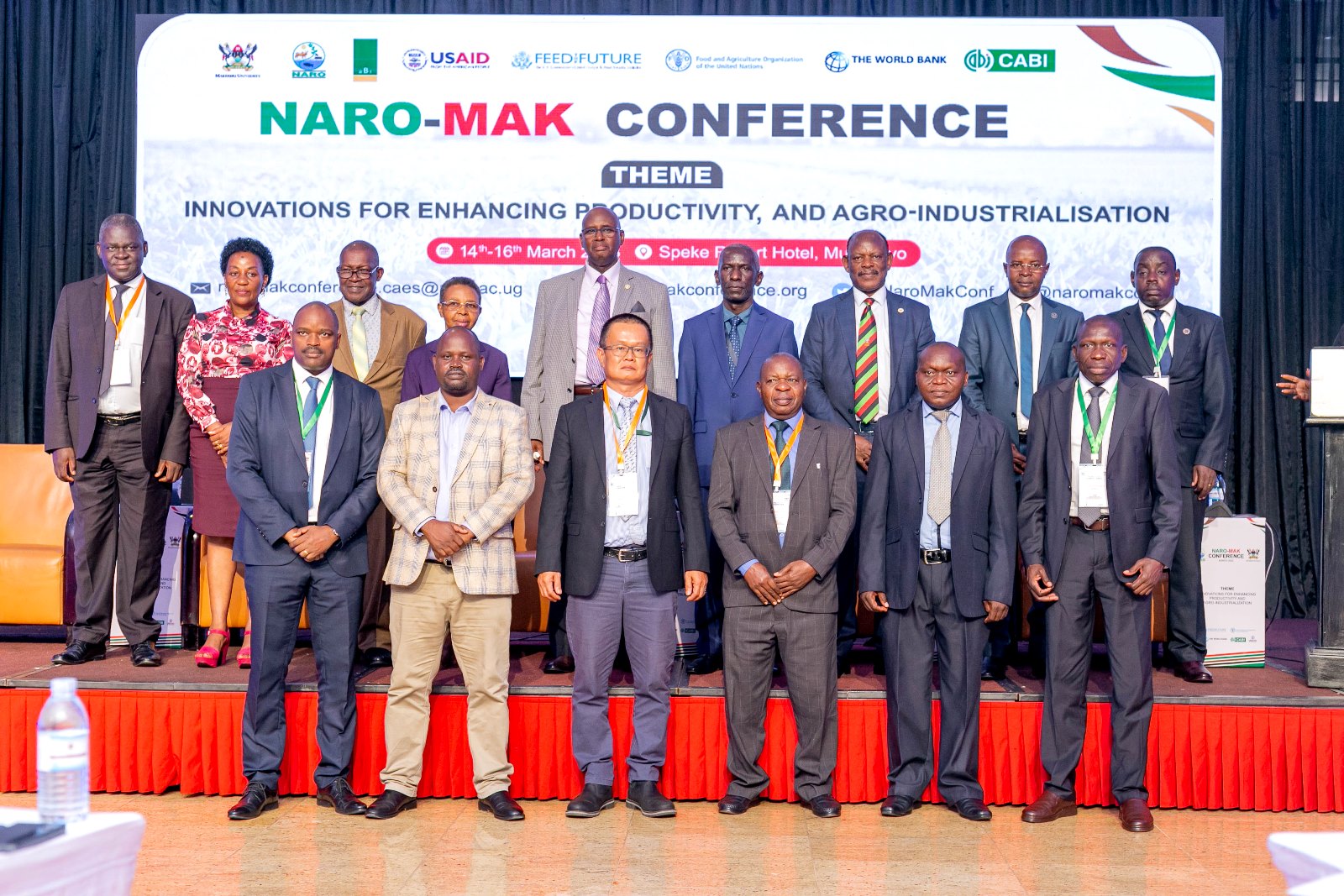
Conference theme: Innovations for enhancing productivity and agro-industrialization
Overview
Uganda’s Vision 2040, the National Agricultural Extension Policy (NAEP), the National Agricultural Policy (NAP) and the National Agricultural Extension Strategy (NAES) strategically place agriculture as a key driver to achieve socio-economic transformation in the country. The third National Development Plan (NDPIII, 2020/21-2024/25) prioritizes Agro-industrialization as a great opportunity for Uganda to embark on its long-term aspiration of increasing household incomes and improving the quality of life. Despite the fact that the economies of many African countries are still driven by agriculture, the sector remains crippled due to several challenges including climate change; inappropriate seed systems, production practices, and post-harvest management; as well as pests and diseases. The need to feed the world’s increasing population with minimal pressure on the ecosystem brings to the forefront the critical role of innovation across the entire value chain. Increased productivity is insufficient without an efficient value chain to move produce from the farm to the fork. Efficient value chains need to be supported by innovations along the pipeline.
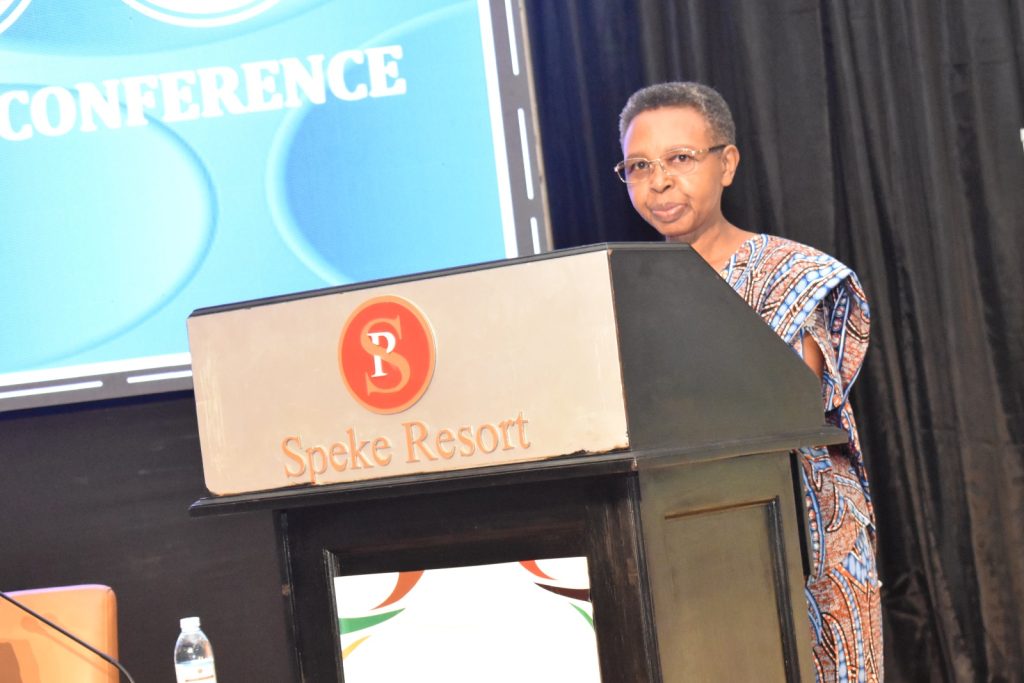
The NARO-Mak Joint Scientific Conference
As key players in the agricultural sector, the National Agricultural Research Organization (NARO) in collaboration with Makerere University in 2018 introduced the NARO-Makerere Joint Scientific Conference to serve as a platform for evidence-based dialogue on measures to transform the sector, with special focus on innovations for agro-industrialization. The conference therefore seeks to engage stakeholders including government, research and innovation systems as well as development partners to find options for accelerated agro-industrialization on the African continent. The Conference also provides opportunity for stakeholders to show-case advances in research and innovation that can contribute to the development and transformation of the agricultural sector. According to Dr Imelda N. Kashaija, Chair of the Organizing Committee of the Third NARO-Mak Joint Scientific Conference, a key gap in the development of the agricultural sector is the aspect of incomplete value chains. “Africa needs to embrace and nurture agricultural value chains that are competitive locally and at the global level. At the same time, the value chains should support the budding agro-industry. The agricultural sector must continuously innovate to compete in the changing ecosystem. Appropriate and evolving seed systems, production practices, post-harvest management and value addition to improve marketability are necessary for continuous innovation.”
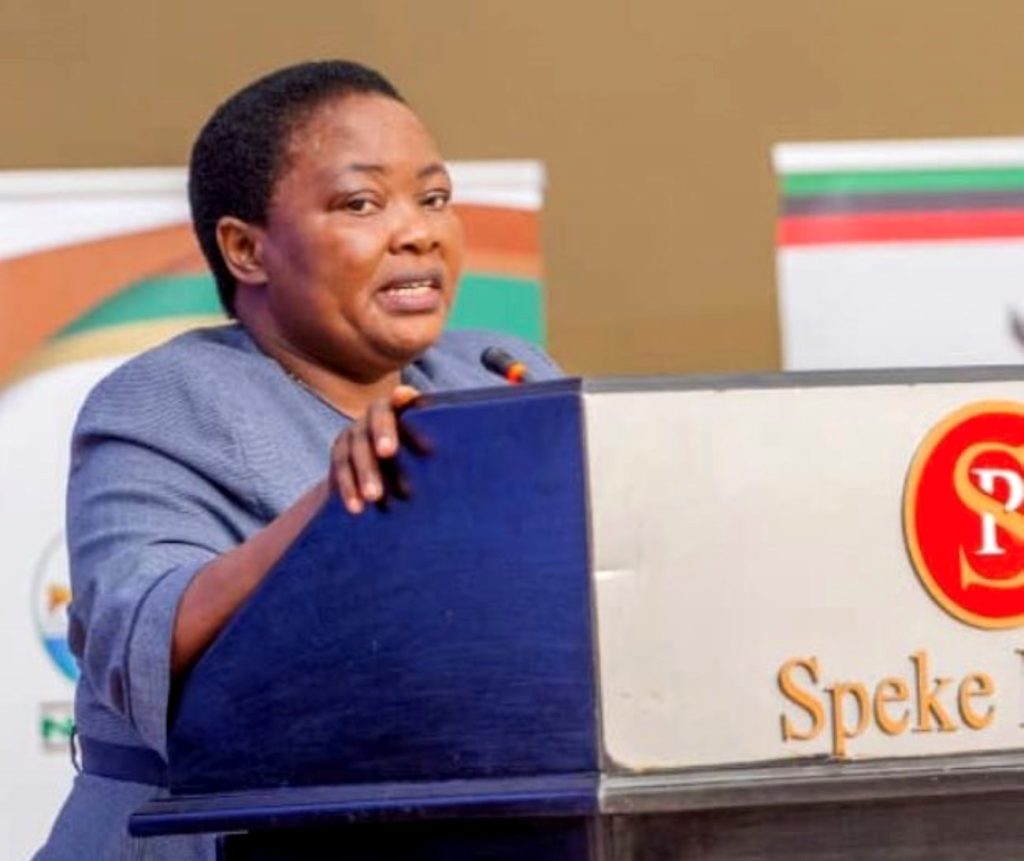
The Third Joint Scientific Conference held at Speke Resort Munyonyo
The NARO-Makerere Third Joint Scientific Conference held on 14th-16th March 2023 at Speke Resort Munyonyo sought to establish appropriate and viable strategies towards accelerated agro-industrialization, with focus on the African continent. It was officially opened by the Prime Minister of the Republic of Uganda, the Rt. Hon. Robinah Nabbanja and graced by the Minister of State for Animal Industry, Hon. Bright Rwamirama; the Vice Chancellor of Makerere University, Prof. Barnabas Nawangwe; the Chair NARO Council, Dr William Olaho Mukani; the Director General NARO, Dr Ambrose Agona; the Chief of Party, USAID Feed the Future, Mr. Anthony Nyungu; the Principal, College of Agricultural and Environmental Sciences (CAES), Prof. Gorettie Nabanoga; and the Director, Directorate of Research and Graduate Training, Makerere University, Prof. Edward Bbaale.
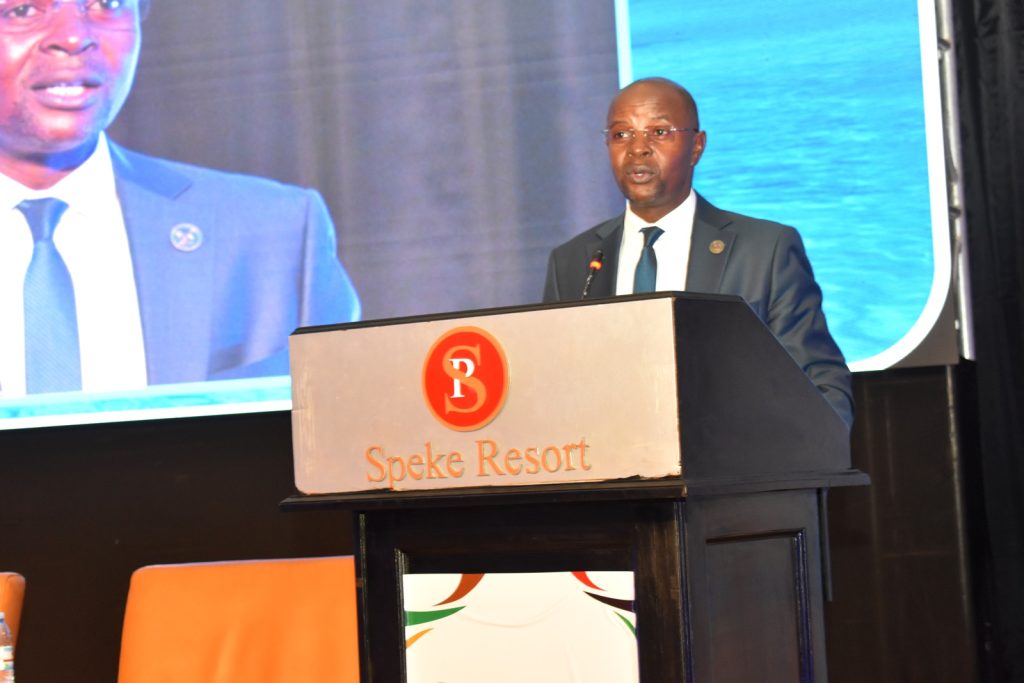
Organized under the theme; Innovations for enhancing productivity and agro-industrialization, the conference aimed to bring to the forefront, cutting edge innovations and opportunities supportive to Africa’s agro-industrialization drive, provide a platform for the establishment of viable networks and collaborations that will catalyze agro-industrialization, and to stimulate generation of new knowledge to address emerging challenges. During the three-day conference, participants including researchers from Makerere University and NARO as well as representatives from the public and private sector deliberated on a number of issues in line with challenges and opportunities in Mechanization and Agro-Industrialization; modernization of post-harvest management and food safety systems; intensification of crop productivity and seed systems; acceleration of the development of the Animal Resources-based Industry; management of interactions amongst agriculture, fragile ecosystems and the changing environment; and embracing ICT-based innovations for agricultural transformation. The conference featured keynote presentations by eminent researchers and policymakers. Mr. Ollen Wanda from Uganda Development Cooperation addressed participants on the challenges and opportunities in mechanization and agro-industrialization, whereas Prof. Robinson Mdegela from Sokoine University in Tanzania discussed the impact of COVID-19 on food systems.
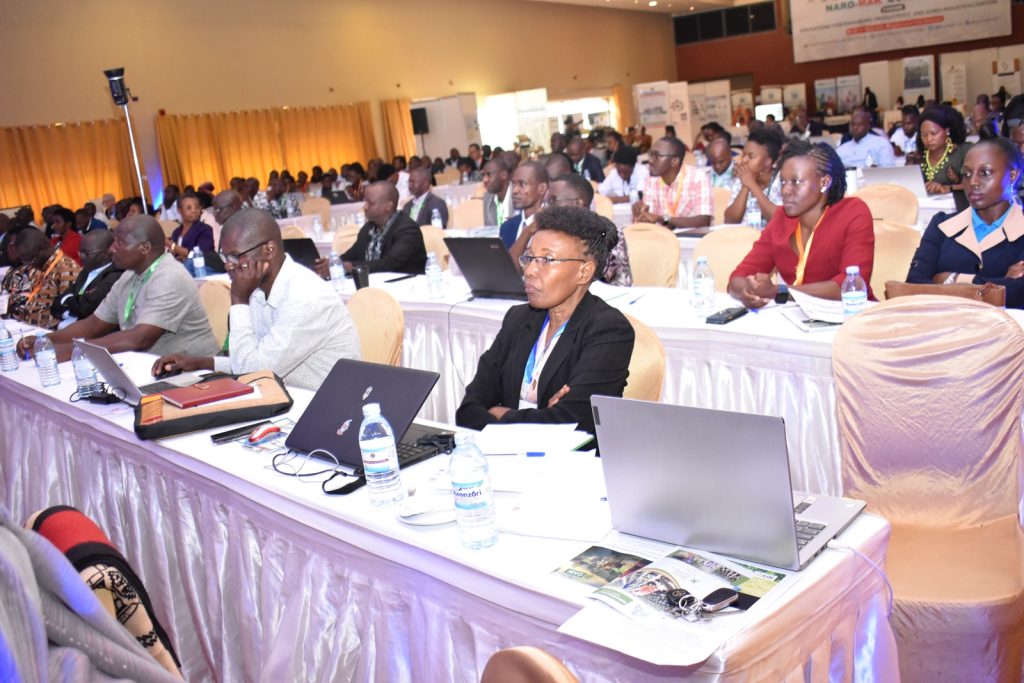
Other keynote presentations included, the implications of the Russia-Ukraine War on Uganda’s Agriculture by Ms. Florence Nakazzi from the Economic Policy Research Centre; opportunities for modernizing post-harvest management for food and nutritional security by Prof. Archileo N. Kaaya from CAES, Makerere University; accelerating the development of the Livestock-based industry by Dr Sylvia B. Angubua; enhancing ICT-based innovations for agricultural transformation by Mr. Collin Babirukamu, Director E-government Services, NITA-U; intensification of crop productivity in the context of changing food systems by Prof. Patrick Okori from RUFORUM; sustainable management of agricultural production systems in a changing climate by Dr John Wasige from Busitema University; and the progress made in soybean research in Uganda by Prof. Phinehas Tukamuhabwa from CAES.
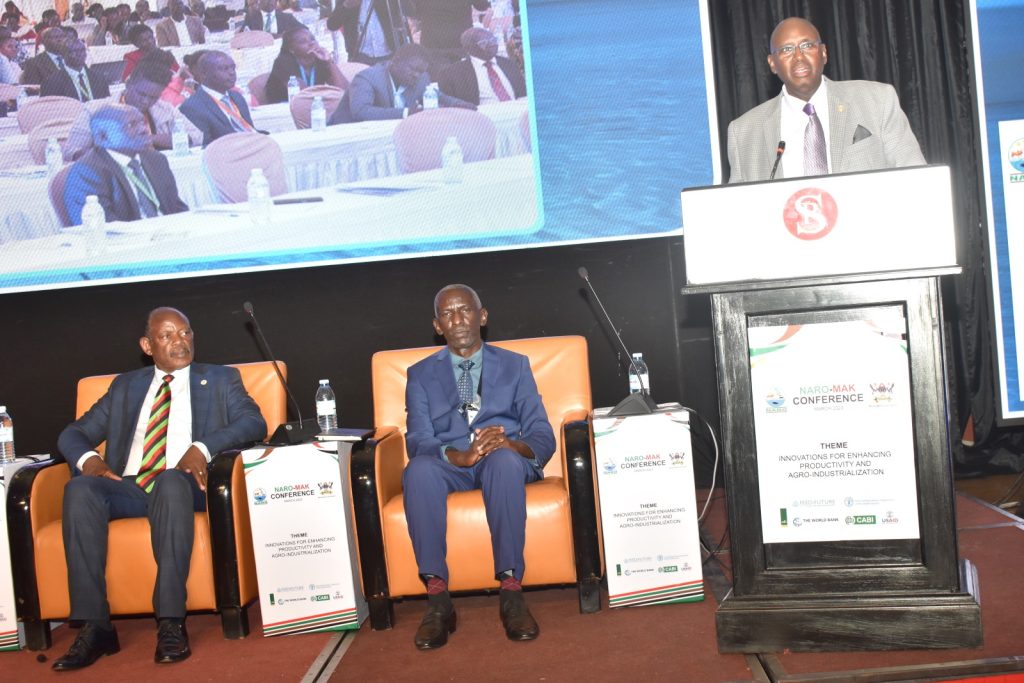
The conference also featured a panel discussion on the oil palm industry in Uganda. Panelists included Dr Gaberial Damulira, Principal Research Officer and Programme Leader, Horticulture and Oil Palm Programme at NARO; Dr Abubaker Muhammad Moki, Commissioner Policy Development and Capacity Building at Cabinet Secretariat, Office of the President, Government of Uganda; Mr. David Balironda, General Manager, KOPGT; and Mr. Chin Pit Te from AGM Oil Palm Bavuma Ltd.
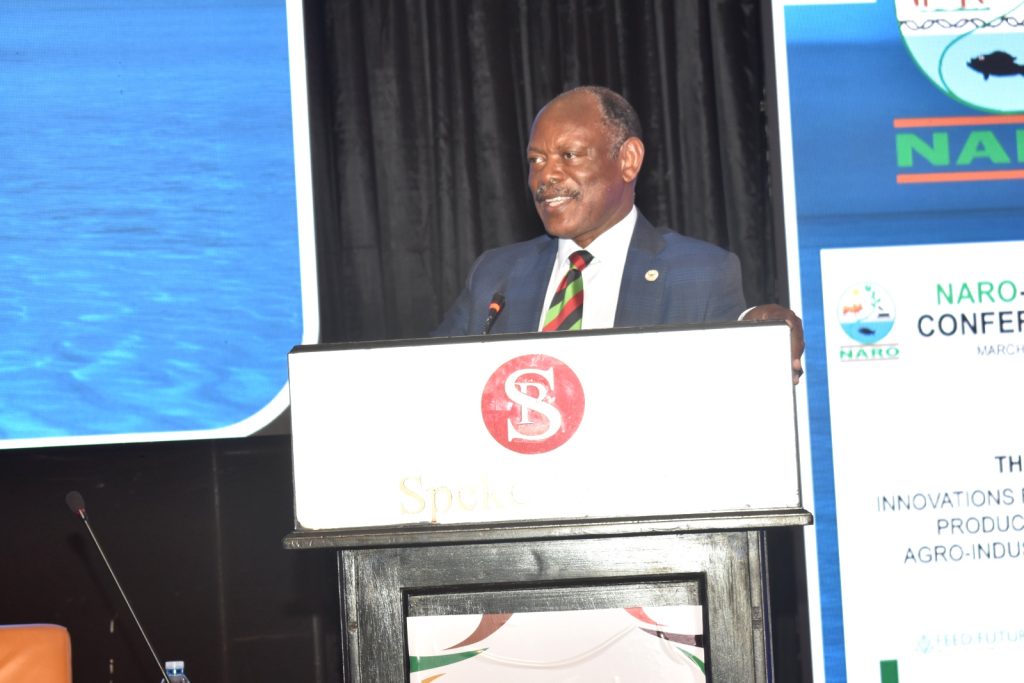
Issues arising from the conference and recommendations
- The country invests only 0.3% of its GDP in research contrary to 1% recommended by the African Union. Many good ideas cannot be implemented due to lack of funding. Governments urged to invest more in research.
- Shifts in policy focus across political periods hindered agro-industrialization. To unlock the vast opportunities in agro-industry, Mr. Ollen Wanda from Uganda Development Cooperation advised that the functional/institutional based planning and budgeting approach where limited resources are allocated to broad functional areas such as extension, mechanization, irrigation, marketing without specifically targeting a particular commodity must be changed.
- Agricultural research must be broadened beyond focus on staple food commodities to other commodities of great commercial and export potential.
- Agricultural research must also be re-aligned to meet the needs of agro-industrialization.
- There is need to develop agro-industry specific integrated infrastructure and facilities such as agro-industrial parks to facilitate tertiary processing.
- Promote affordable and competitive financial products for mechanization and agro-industry for example agro-industry infrastructure and investment contingency fund.
- There is need to scale up investments in high potential commodity value chains such as cotton that have big domestic and global market value.
- In its pursuit to move the country towards middle income status, government should consider up-scaling agriculture. According to Dr John Wasige from Busitema University, subsistence farming does not create wealth. Government should therefore support farmers to engage in commercial agriculture. In his presentation on sustainable management of agricultural production systems in a changing climate, Dr Wasige noted that 90% of soil in Africa is depleted and cannot support quality agricultural production calling for interventions to improve the quality of soil. “There is need to invest in soil fertility management and irrigation. Rain-fed agriculture is not sustainable”.
- The National Fertilizer Policy (2016) should be implemented as a measure to improve the quality of soil.
- In a bid to embrace ICT-based innovations for agricultural transformation, government should consider lowering the cost of smart phones and expanding access to internet.
- Researchers called for the establishment of an E-Agriculture working group that includes Agricultural Policy and technical resources, Academia, NITA/MoICT, and development partners. They also called for the creation of a cloud-based system for Agriculture.
- There is need for vibrant seed systems focusing on crops, livestock, fisheries and forestry.
- Strengthen regional integration with a focus on context specific solutions to minimize the impact of pandemics
- Build a resilient system to serve during and after emergence of pandemic such as COVID-19.
- Put in place appropriate financing products and services.
- In a bid to modernize post-harvest management for food and nutrition security, strengthen cooperatives and credit systems for producers. It is also important to construct regional modern storage structures for grains and perishable commodities.
- Development of the Oil Palm Industry – Uganda only produces 80,000 metric tonnes of oil palm, way below the required 410,000 tonnes. There is need for research to generate appropriate technologies to support the sector.
- Government should empower young people to embrace agriculture as a viable means of employment.
- Researchers called for the elimination of fake agro-chemicals on the market
- Discussing the implications of the Russia-Ukraine war on Uganda’s Agriculture, Ms. Florence Nakazi from EPRC said Uganda should strive to have self-sufficiency to reduce its import dependency, and leverage on NDP III’s agro-industrialization strategies to develop wheat substitutes.
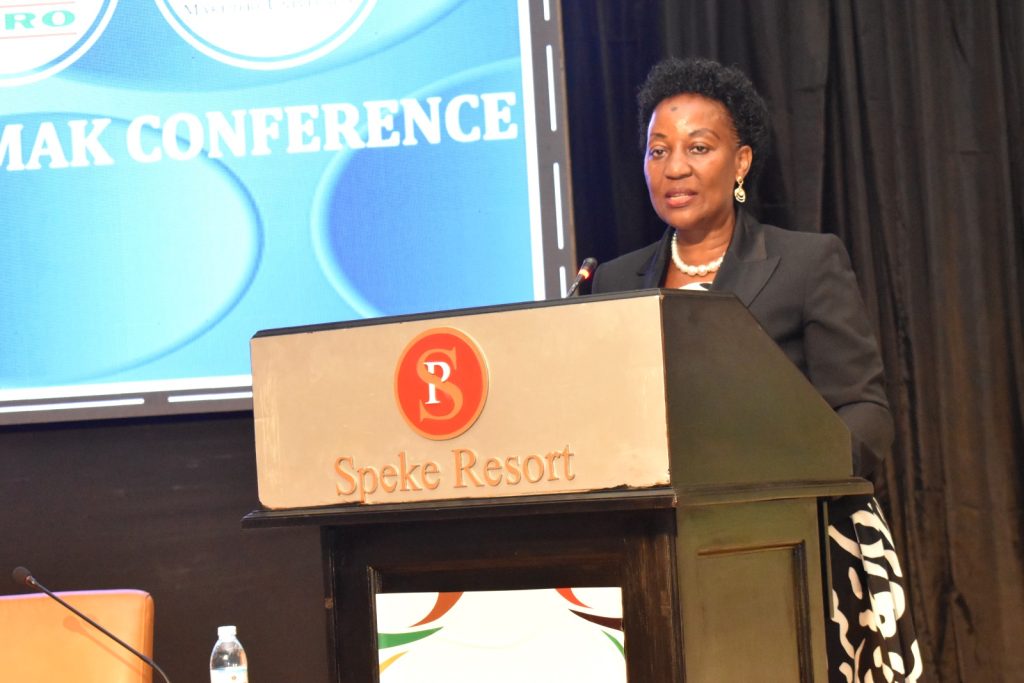
Remarks by the Prime Minister
In her remarks, the Prime Miniter of the Republic of Uganda, the Rt. Hon. Robinah Nabbanja appreciated NARO and Makerere University for the joint research efforts that have significantly contributed to the development of the agricultural sector, and supported government efforts aimed at moving the country to middle income status. “This conference comes slightly over one year since the President of the Republic of Uganda, H.E. Gen. Yoweri Kaguta Tibuhaburwa Museveni launched the Parish Development Model in Kibuku District. The Parish Development Model is our blueprint for organizing and delivering public and private sector interventions for wealth creation and employment generation at the parish level as the lowest economic planning unit. It therefore gives me great joy to see that the Conference theme speaks directly to some of the current efforts by Government to transition our farmers from subsistence to commercial agriculture.” Commenting on the poor state of soils, a factor greatly undermining production, the Prime Minister pledged to push for the review and implementation of the National Fertilizer Policy (2016). The Prime Minister pledged more government funding towards research and innovation. “The Government is committed to funding research aligned to the national development priorities.”
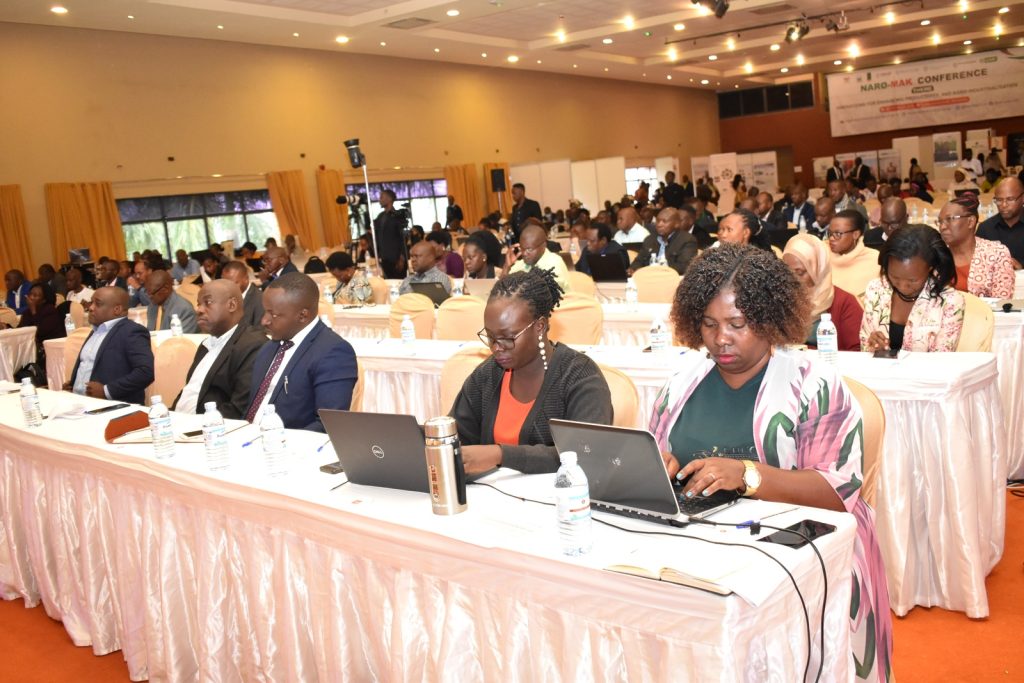
Remarks from MAAIF
On behalf of the Minister of Agriculture, Animal Industry and Fisheries (MAAIF), Hon. Bright Rwamirama, Minister of State for Animal Industry commended Makerere University and NARO for the significant research output. “Government appreciates the role of science in transforming economies and is committed to supporting scientific research and innovations,” he noted. Commenting on the poor state of soils, as one of the challenges undermining agricultural production, Hon. Rwamirama said the use of fertilizers and irrigation was no longer an option and that government was scaling up interventions towards modernization of agriculture. The Minister reiterated the need for homegrown solutions for challenges affecting the sector.
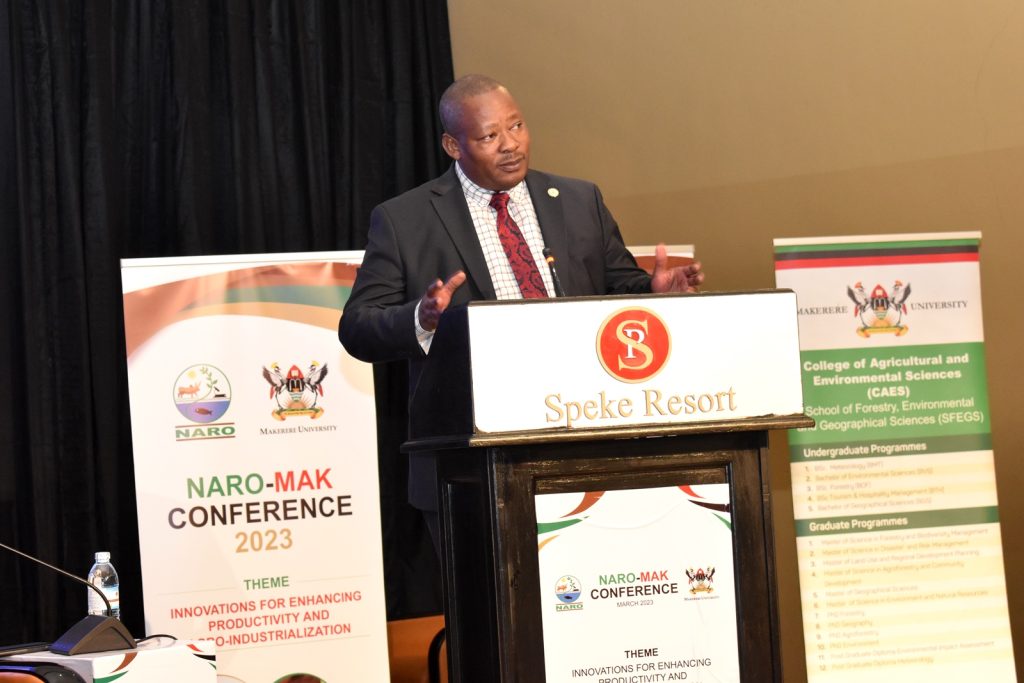
Remarks by the Vice Chancellor
The Vice Chancellor of Makerere University, Prof. Barnabas Nawangwe acknowledged the research efforts by CAES and NARO, noting that CAES contributes 30% of research and publications at Makerere. He called for more funding towards research noting that the country spends only 0.3% of its GDP on agricultural production contrary to 1% recommended by the AU. The Vice Chancellor emphasized the importance of collaboration in research. “In modern times, research is about collaboration, the more you collaborate, the better the quality of research and output.” Highlighting the challenges crippling the agricultural sector, the Vice Chancellor explained that achieving the desired transformation calls for innovativeness. “I am happy to note that as Makerere aspires to become a research-led university as per the 2020/2030 Strategic Plan, innovativeness is one of our strategic areas of focus. It is gratifying to note that our agricultural College – CAES has adopted an ‘Innovation Intentional’ agenda enshrined in the College Transformational Pact with the aim of increasing innovativeness amongst staff and students. With this, we expect to see more innovations at the College that will greatly boost Agricultural production and agro-industrialization.” The Vice Chancellor appreciated the Government of Uganda and development partners for the support extended towards research and innovation at Makerere University.
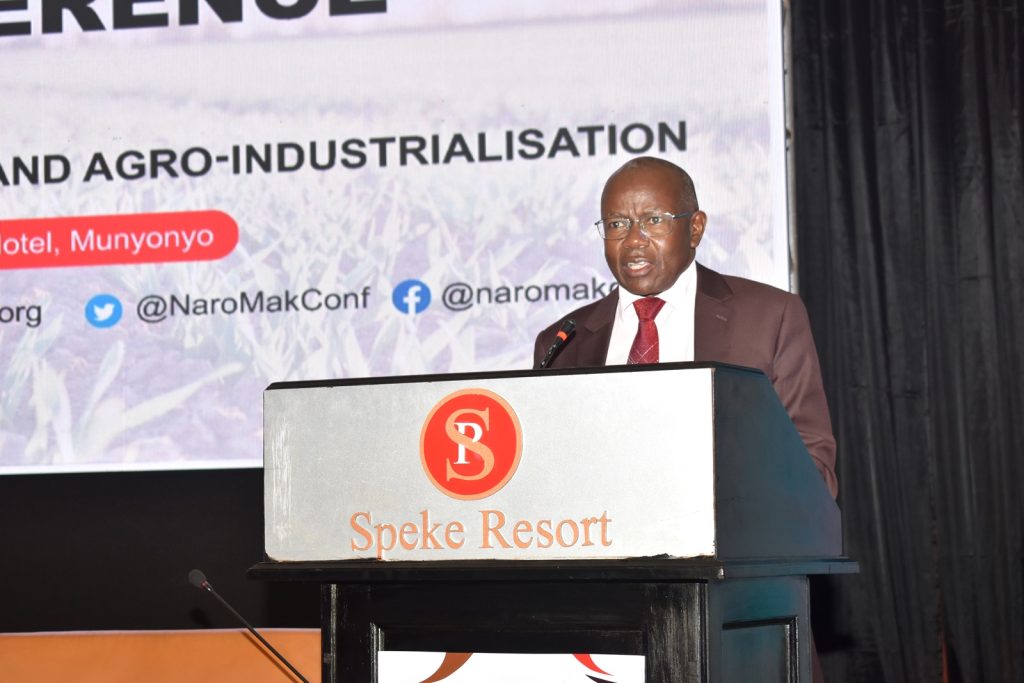
Chair NARO Council
The Chairperson, NARO Council, Dr William Olaho Mukani reiterated the importance of innovation in the development of sustainable agriculture. “Our products do not meet international standards because of aflatoxins. “There is need for interventions to enhance the quality of our products. We appeal to the Government to set up an Agricultural Research and Innovations Fund.” Similarly, the Director General of NARO, Dr Ambrose Agona emphasized the importance of science and innovation in transforming the sector calling for more funding towards scientific research.
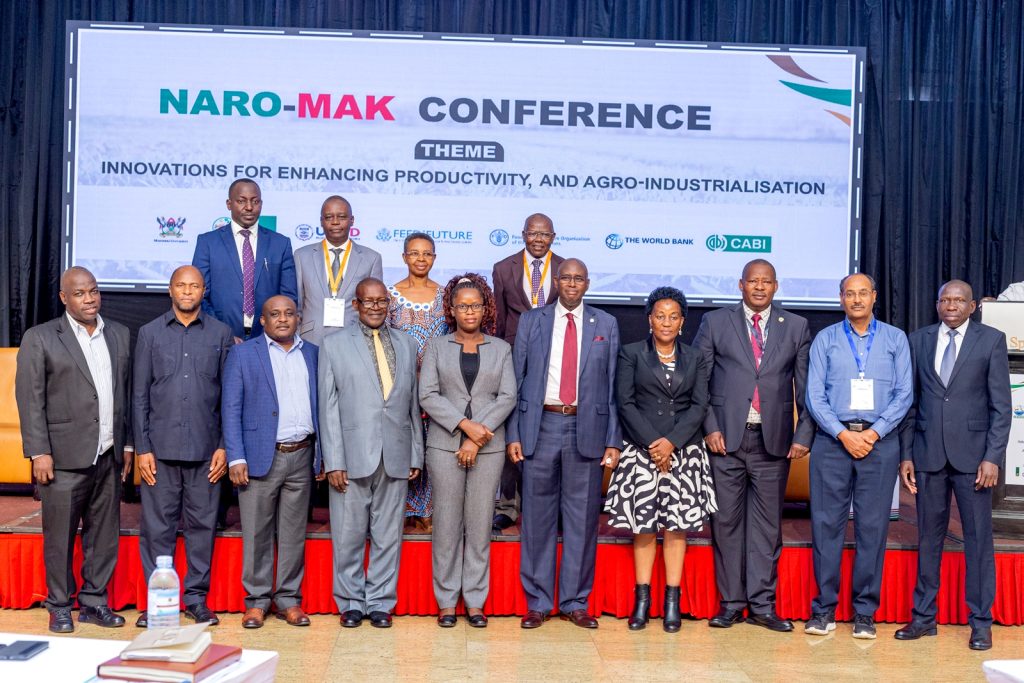
Remarks by the Principal CAES
The Principal of CAES, Prof. Gorettie Nabanoga briefed participants of the College’s Innovation Intentional Agenda aimed at transforming the mode of operations to increase innovations. “In line with Strategic Goal 1 that seeks to transform Makerere into research-led institution, the College of Agricultural and Environmental Sciences (CAES) is transforming its mode of operation in order to stimulate innovativeness and entrepreneurship within learners and faculty. In 2022, a “Pact” for Transformation Change at CAES was developed through which we shall be innovative and intentional on transforming into a College, with effective and efficient management systems, adequate supportive infrastructure and highly motivated staff to drive our Innovation Intentional agenda. Through our three schools namely; the School of Agricultural Sciences, School of Food Technology Nutrition and Bio-engineering and the School of Forestry, Environmental and Geographical Sciences and 14 research institutes, our staff shall productively engage with stakeholders and produce skilled, entrepreneurial, innovative and work-oriented graduates, able to innovatively respond to challenges, needs and aspirations in the Agricultural and Environmental sectors.”
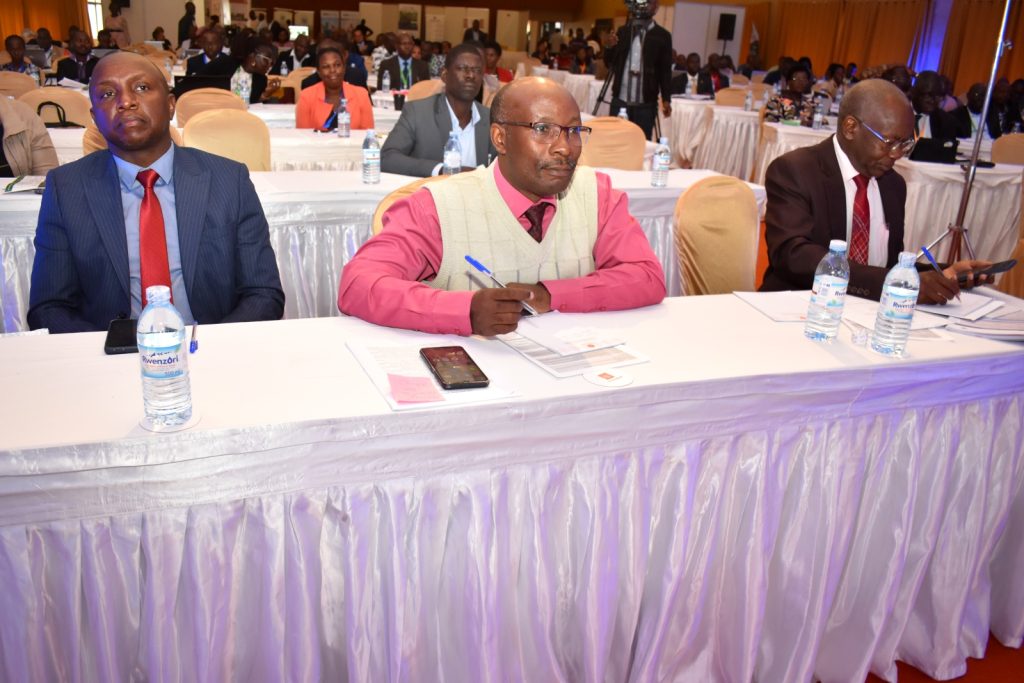
She expressed gratitude to the Government of Uganda and all development partners for supporting research at CAES and the University in general. She acknowledged the long-time partnership between CAES and NARO that has yielded several results hence transforming the agricultural sector. She appreciated the University Council and Management for supporting CAES initiatives. She also appreciated the Conference organizing committee led by Dr Imelda N. Kashaija.
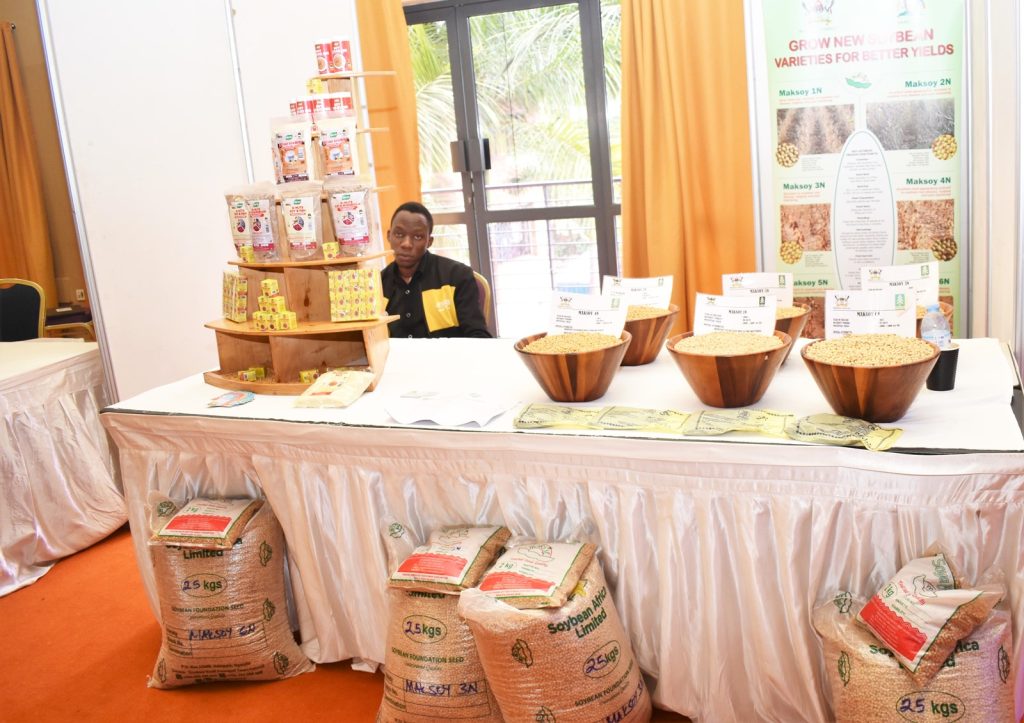
The conference was supported by FAO Uganda, the World Bank, aBi Development Ltd, USAID Feed the Future, CABI-Africa, Agriculture Search Activity, Nile Breweries Ltd, and Dr Nicholas Kiggundu from CAES.
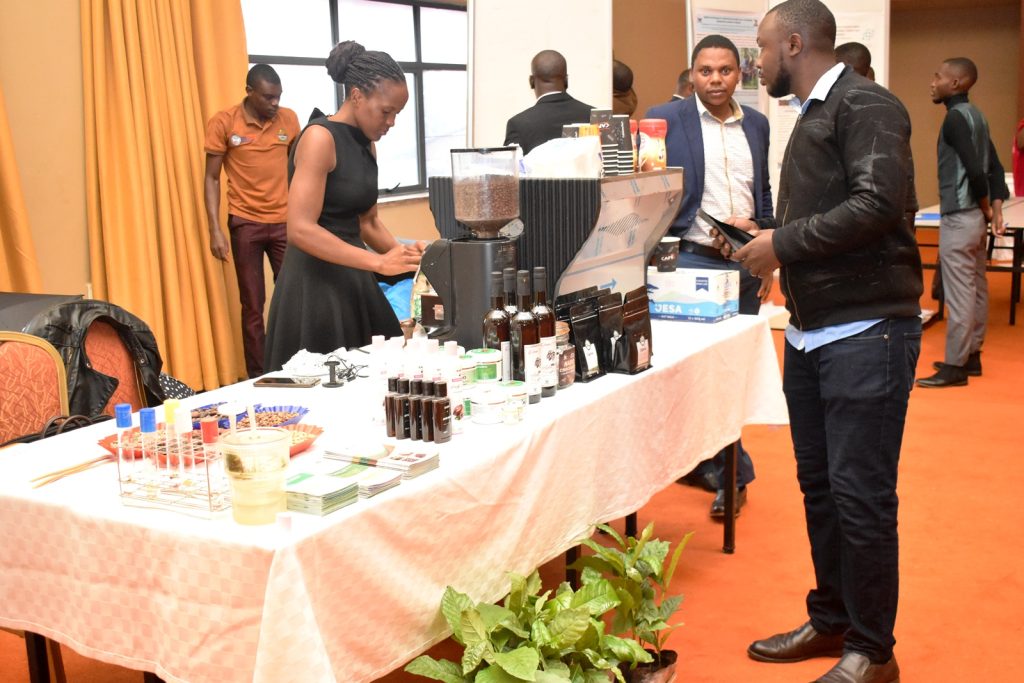
Keynote Presentations:
- Implications of the Russia-Ukraine war on Uganda’s Agriculture – Florence Nakazi, EPRC
- Challenges and Opportunities in Mechanization and Agro-industrialization in Developing Countries – Ollen Wanda Kahurubuka, UDC
- Minimizing the Impact of COVID-19 on Food Systems – Robinson Mdegela, AFROHUN, SUAMT
- Progress in Soybean Research and Seed System in Uganda – Phinehas Tukamuhabwa et al., MAKCSID
- Intensification of Crop Productivity in the Context of Changing Food Systems – Patrick Okori, RUFORUM
- Enhancing ICT-based Innovations for Agricultural Transformation: Modernization of Agricultural Value Chains – Collin Babirukamu, NITA-U
Additional Resources:
Book of abstracts: https://naromakconference.org/schedule/
Conference pictorial: https://drive.google.com/drive/folders/1ZM3HMlS_sPBZPepZrt_jbT5zV6WYtQGC?usp=share_link
Conference pictorial: https://drive.google.com/drive/folders/1-_sp5Tki2xtSDBG0Pluia5gzUde5QJdB?usp=share_link
You may like
-
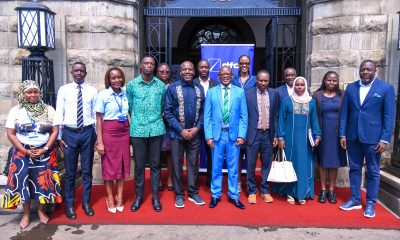

Makerere University, DFCU Bank Sign MoU to Advance Innovation, Student Leadership and Research
-
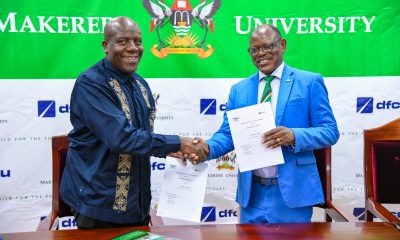

Press Release: Mak & DFCU Partner to Enhance Higher Education, Research & Student Support
-
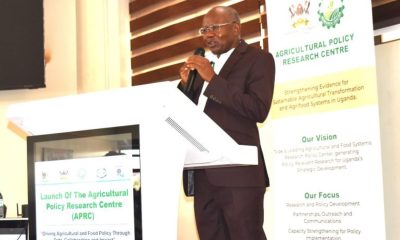

APRC Trains Graduate Students & Stakeholders in the Use of the African Agriculture Adaptation Atlas
-
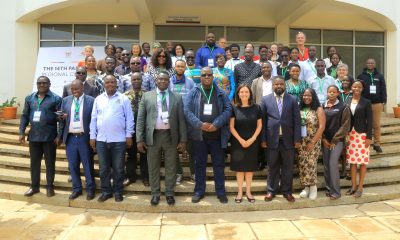

Harmonizing Africa’s Future through Musical Arts Education
-
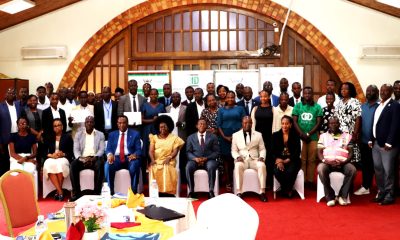

Swedish Ambassador Calls on Uganda to Lead Africa’s E-Mobility Revolution
-
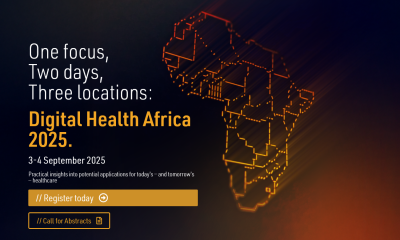

Call for Abstracts: Digital Health Africa 2025
Agriculture & Environment
APRC Trains Graduate Students & Stakeholders in the Use of the African Agriculture Adaptation Atlas
Published
2 days agoon
July 3, 2025
The Agricultural Policy Research Centre (APRC), housed within the College of Agricultural and Environmental Sciences (CAES) at Makerere University, continues to play a pivotal role in shaping Uganda’s agricultural future through evidence-based policymaking. With a mission to ensure that agricultural policies are grounded in empirical research and data, APRC is actively investing in capacity-building initiatives that empower researchers, policymakers, and development actors.
In a significant stride toward building climate resilience in African agriculture, APRC recently organized a two-day intensive training workshop focused on the African Agriculture Adaptation Atlas (AAAA) – a state-of-the-art, web-based decision-support platform that facilitates the integration of climate data into agricultural planning and policy.

The workshop, held on Wednesday 25th and Thursday 26th June 2025 at the School of Agricultural Sciences, Makerere University, targeted two key groups: graduate students on the first day, and university faculty, government officials, and development practitioners on the second. This structure ensured tailored learning experiences for both emerging and seasoned professionals, helping to bridge the gap between academic research and real-world policy implementation.
The African Agriculture Adaptation Atlas (AAAA) is designed to provide dynamic, data-rich visualizations that support informed decision-making in agriculture and food systems across the continent. Through interactive maps and analytical tools, users can explore projected climate impacts, evaluate risks, and identify localized, climate-smart adaptation strategies.

Throughout the sessions, participants received hands-on training in a broad range of AAAA functionalities, including:
- Leveraging the Atlas for research and policy communication: Enhancing the ability of scientists and policy actors to translate complex climate data into actionable insights;
- Assessing projected climate impacts and associated agricultural risks: Essential for forward-looking planning and risk mitigation;
- Identifying climate-smart investment options, with a particular focus on the livestock sector, which is especially vulnerable to climate shocks;
- Analysing gendered vulnerabilities: Examining how climate change disproportionately affects women in agricultural communities;
- Understanding the implications of heat stress on agricultural productivity: Supporting targeted interventions to protect producers and their livelihoods;
- Estimating the economic returns of adaptation strategies: Aiding in prioritizing investments and allocating limited resources effectively.

Prof. Bernard Bashaasha, the APRC Coordinator, emphasized the importance of the training in advancing Africa’s adaptation agenda. “As climate change continues to threaten food security and disrupt livelihoods across the continent, tools like the AAAA, and the skills to use them effectively are essential. They empower decision-makers to craft policies that are adaptive, inclusive, and rooted in science,” he noted.
The workshop was coordinated by Dr. Florence Rwiza, Lecturer in the Department of Agribusiness and Natural Resource Economics at CAES.
More photos from the Training






Agriculture & Environment
NbS4Tea Project Team Makes Great Progress, Deploys Drones for Data Collection
Published
2 weeks agoon
June 24, 2025
****Funded by the Danish Fellowship Centre under Denmark’s Ministry of Foreign Affairs, NbS4Tea is a five-year initiative aimed at enhancing climate resilience and tea productivity in Uganda.
Launch of drones for data collection
The Nature-based Solutions for Tea (NbS4Tea) project has registered a significant milestone with the successful deployment of drones to improve environmental and agricultural data collection.
On 19th June 2025, the project team officially launched the drones at the Rwebitaba Tea Research Centre in Kyenjojo District, the project’s main research hub. The launch event included hands-on training sessions by Mr. Timothy Mutungi, a certified Remote Sensing Drone Pilot. Mr. Mutungi provided detailed instruction on drone operation, safety procedures, and data acquisition techniques specifically tailored to the project’s goals. The training was attended the core NbS4Tea researchers as well as students supported by the project.

By utilizing drone technology, the team will be able to capture high-resolution imagery and gather critical environmental data across vast tea-growing areas. This will enable more precise assessments of biodiversity, soil health, water use, and overall ecosystem services. The valuable insights generated will guide the development of sustainable, nature-based agricultural practices with the potential for widespread adoption throughout the tea industry.
About the NbS4Tea Project
NbS4Tea is a five-year initiative aimed at enhancing climate resilience and tea productivity in Uganda. Funded by the Danish Fellowship Centre under Denmark’s Ministry of Foreign Affairs and led by Dr Emmanuel Arthur from Aarhus University, the project is being implemented through a consortium of Ugandan and Danish institutions namely: Makerere University, the National Agricultural Research Organization (NARO), Uganda, Uganda Tea Association, Aarhus University, Denmark, and Kick-start International.

The primary objective of the project is to sustainably close the tea yield gap in Uganda by developing research-driven, nature-based solutions that enhance the climate resilience of tea production systems. This involves identifying climate-resilient tea varieties, integrating tea prunings and banana by-products, utilizing nitrogen-fixing agroforestry trees, and improving irrigation management. The approach emphasizes socio-economic feasibility, capacity building in research, and a market-oriented, multi-stakeholder collaboration to ensure both environmental and economic sustainability.
At Makerere University, the project is coordinated by Dr Alex Nimusiima from the Department of Geography, Geo-Informatics and Climatic Sciences at CAES. Other Project members are; Dr Grace Nakabonge from the Department of Forestry, Biodiversity and Tourism; Dr Prossy Nakawuka from the Department of Agricultural and Bio-systems Engineering; Dr Twaha Ali Basamba from the Department of Agricultural Production; and Dr Alice Turinawe from the Department of Agribusiness and Natural Resource Economics.

Specific objectives
- Identify and quantify climate change impacts on tea yield and quality based on historical and newly obtained data and novel data mining methods.
- Screen, select and recommend tea varieties adapted to abiotic (drought and heat) and biotic stresses (diseases and pests).
- Develop new knowledge on the potential of local waste biomass (tea prunings, banana pseudostems and peels) as soil amendments- mulch, compost, biochar, to recycle nutrients, improve soil fertility, increase carbon sequestration and alleviate drought.
- Reveal NbS through agroforestry combined with organic mulch, irrigation and resilient tea varieties that increase biodiversity and tea yield.
- Innovate new methods to enhance tea production under climate change through rainwater harvest and climate-smart irrigation infrastructure.
- Empower vulnerable groups (women, youth, and people with disabilities) in tea production and processing to ensure multi-actor involvement and socio-economic benefit outreach of the proposed NbS in tea cultivation and production.
- Identify export market strategies for NbS tea products, aligned with consumer preferences.

Progress thus far
Launched in January 2024, the project, organized in five work packages, has registered significant progress. Each of the work packages listed below supports one PhD student and one Masters’ student. The PhD students are: i) Mr. Adiga Hassan from the Department of Geography, Geo-Informatics and Climatic Sciences at CAES conducting research under work package 1; ii) Ms. Sarah Namayengo from the Department of Forestry, Biodiversity and Tourism conducting research under work package 2; Ms. Vivian Namutebi from the Department of Soil Science and Land Use Management undertaking research on work package 3; Mr. Keneth Chelimo from the Department of Agricultural and Biosystems Engineering conducting his research under work package 4; and Ms. Moreen Asasira from the Department of Agribusiness and Natural Resource Economics focusing on work package 5. The Masters students are: i) Ms. Evelyn Katasi from the Department of Environmental Management at CAES (work package 1), Mr. Vereriano Turyahebwa from Department of Forestry, Biodiversity and Tourism (work package 2); Mr. Ben Okurut from the Department of Soil Science and Land Use Management (work package 3); Mr. Augustine Okot from the Department of Agricultural and Biosystems Engineering (work package 4); and Mr. Augustine Kigozi from the Department of Agribusiness and Natural Resource Economics (work package 5)

Work packages and achievements registered
Work Package 1: Climate change impacts on tea yield and quality – Headed by Dr. Alex Nimusiima
This work package centres on the analysis of historical and projected climate conditions in the study area. It examines how current climate patterns influence tea production, as well as the potential effects of future climate change on tea yield and quality.
Progress
i) A household survey assessing the socio-economic status of tea farmers and the effects of climate variability on their livelihoods has been completed.
ii) The collected data has been cleaned, and the Masters student supported under this work package is currently writing her thesis based on the survey findings.
iii) A historical climate analysis of the study area has been conducted by the PhD student, who is now preparing a manuscript.

Work Package 2: Screening & selecting tea genotypes for resilience to abiotic and biotic stresses – Headed by Assoc. Prof. Grace Nakabonge
This work package focuses on evaluating existing tea genotypes for their resistance to pests and diseases, using chlorophyll fluorescence imaging as a diagnostic tool.
Progress
i) A screen house has been constructed to serve as the experimental site.
ii) Germplasm from two tea varieties is currently being cultivated in the screen house in preparation for the upcoming experiments.
iii) A drone has been acquired to assist in data collection for this work package.

Work Package 3: Evaluation of NbS for climate resilience, higher yield and biodiversity- Headed by Assoc. Prof. Twaha Ali Basamba
This focuses on the characterization of mulch and biochar derived from tea prunings to improve soil health. It also aims to quantify the added value of Nature-based Solutions (NbS) in enhancing tea productivity, promoting climate resilience, and supporting biodiversity.
Progress
- So far, Biochar has been produced from tea prunings and characterized.
- The Masters student supported under this work package is writing his thesis on the results of biochar characterization.

Work Package 4: Innovating smart and scalable irrigation technology for improved tea production- Headed by Dr. Prossie Nakawuka
This work package aims to develop and evaluate smart, scalable irrigation solutions to boost tea production. It focuses on assessing how irrigation impacts tea yield and quality, measuring water use efficiency, and analyzing the economic returns of irrigation practices. Additionally, it explores deficit irrigation and climate-resilient strategies to ensure sustainable tea farming in changing environmental conditions.
Progress
- The irrigation infrastructure is now in place and fully operational at Rwebitaba Tea Research Centre in Kyenjojo District.
- The experimental plots for irrigation experiments are already in place with water pipes.

Work package 5: Socio-economic assessment of tea-agroforestry and selected tea varieties – Headed by Dr. Alice Turinawe
This work package emphasizes co-creation within multi-stakeholder innovation networks to evaluate the economic feasibility and market access of tea agroforestry systems. It also focuses on promoting gender balance and understanding consumer valuation of Nature-based Solutions (NbS) tea from Uganda.
Progress
To date, two co-creation workshops have been successfully conducted and the Masters student under this work package is currently analyzing the workshop results as part of their research.

Expected outputs and outcomes
- Increased tea production, productivity, and biodiversity through the adoption of NbS.
- Increased research and technical capacity of Makerere and R-ZARDI.
- Holistic stakeholder insight on economic feasibility, consumer acceptance and market access strategies, especially for vulnerable groups in the tea value chain.
- Increased job prospects for youth and women in tea production sub-sectors.
- Improved social status and increased incomes of tea farmers, traders, and exporters.
- Improved economic and environmental quality by recycling biomass waste into value-added products dedicated to soil enhancement.
- 4+ high-yielding tea genotypes adapted to drought and heat, diseases and pests.
- 15+ scientific articles, conference presentations.
- Five PhDs and Five MSc degrees.
- Market access assessment and empowerment.

Details on the project: https://news.mak.ac.ug/2024/01/new-caes-project-to-improve-tea-production-in-uganda/
More photos from the event



Agriculture & Environment
New Mak-CAES Project to Spur Green Growth in East Africa
Published
3 weeks agoon
June 13, 2025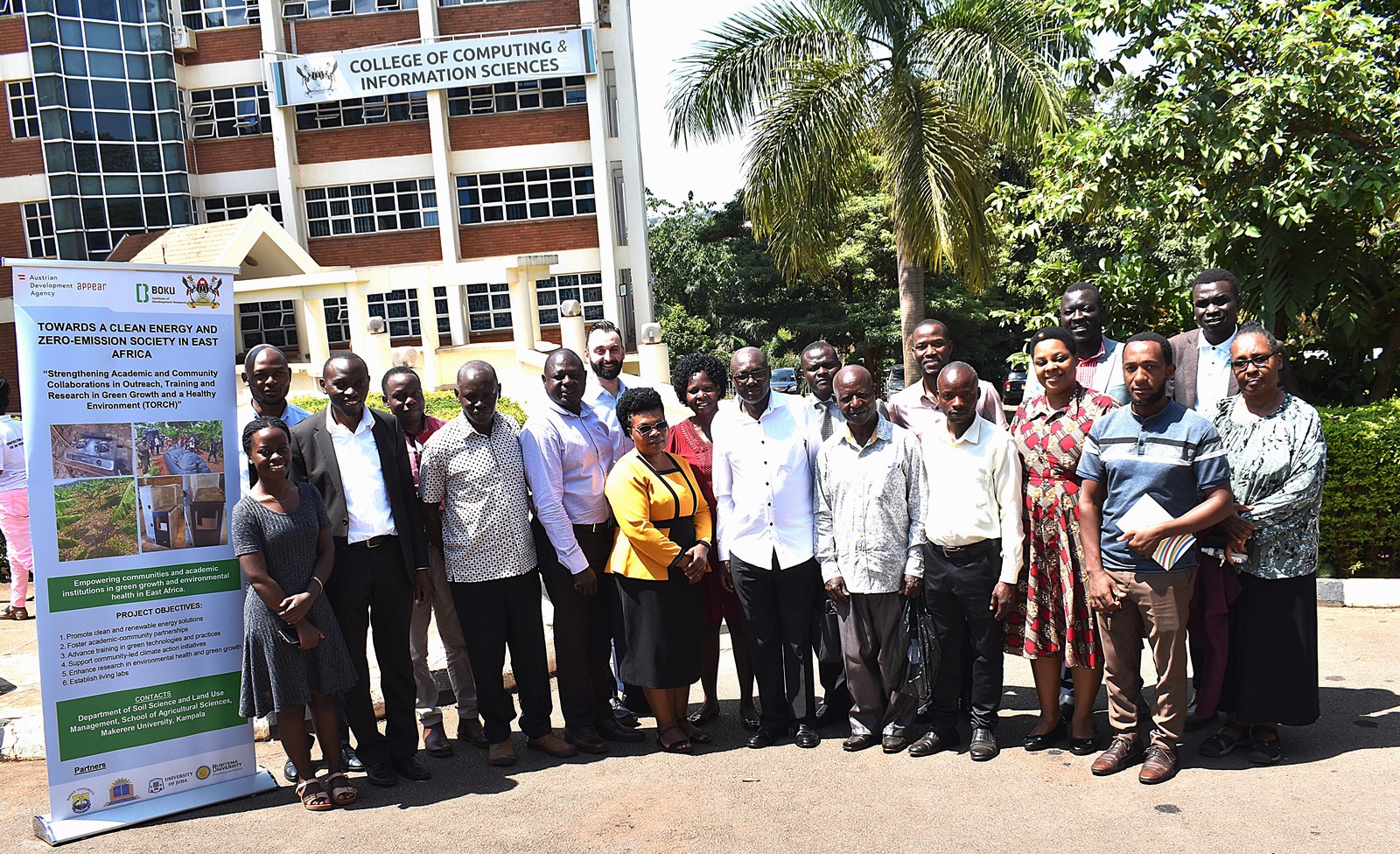
Makerere University, through its Department of Soil Science and Land Use Management at the College of Agricultural and Environmental Sciences (CAES), has launched a new project aimed at fostering green growth and promoting sustainable development across East Africa. This initiative aligns with global efforts to combat climate change and create eco-friendly, low-carbon communities through collaborative research, education, and technology.
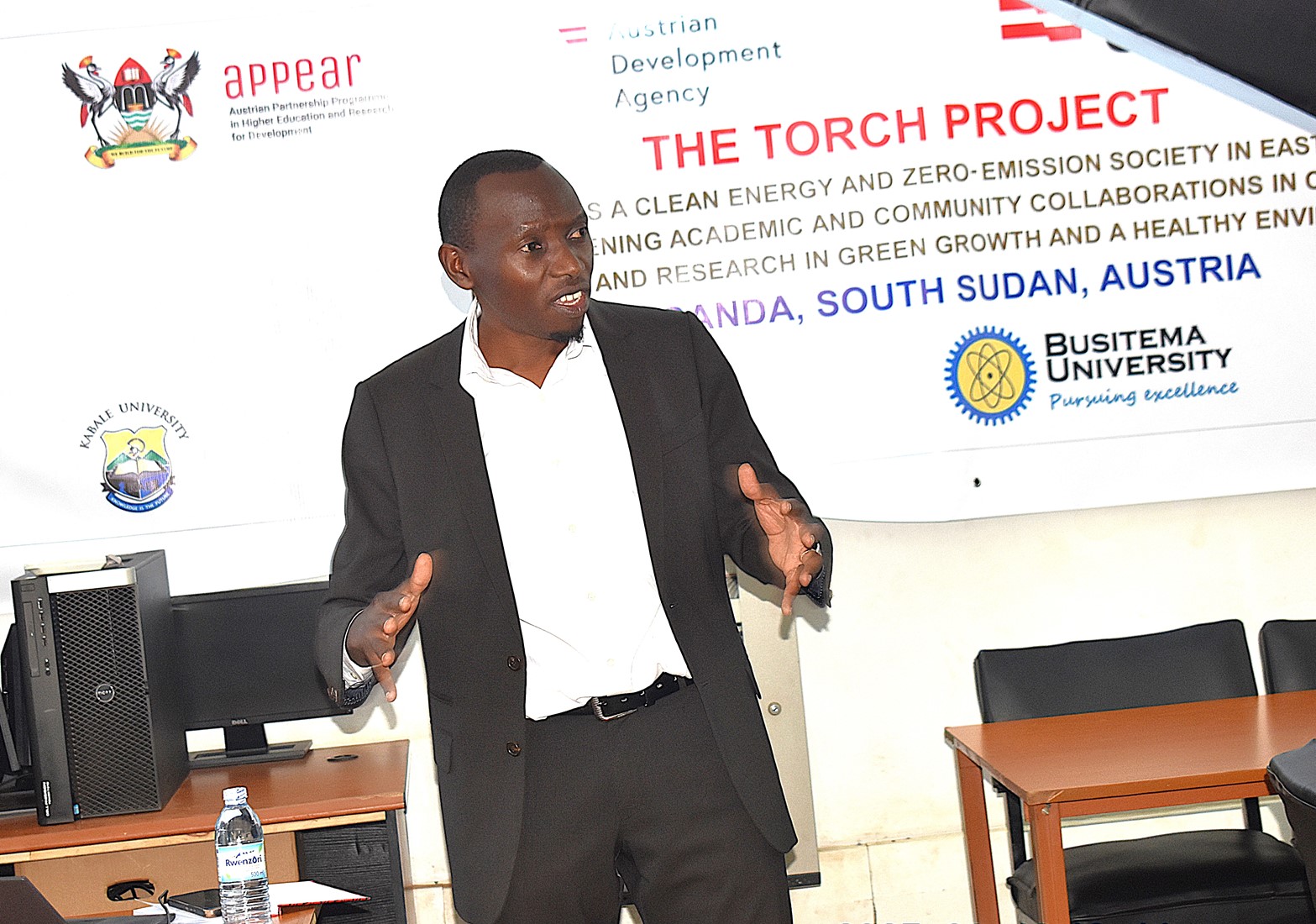
Introducing the TORCH Project: Towards a Clean Energy and Zero-Emission Society
The two-year project, code-named TORCH (Towards a Clean Energy and Zero-emission Society in East Africa), seeks to strengthen cooperation between academia and local communities to promote green growth and environmental sustainability. Funded by the OeAD-GmbH under the Austrian Partnership Programme in Higher Education Research for Development (APPEAR), TORCH focuses on clean energy solutions, carbon emission reduction, and community empowerment through training, research, and co-creation of green technologies.
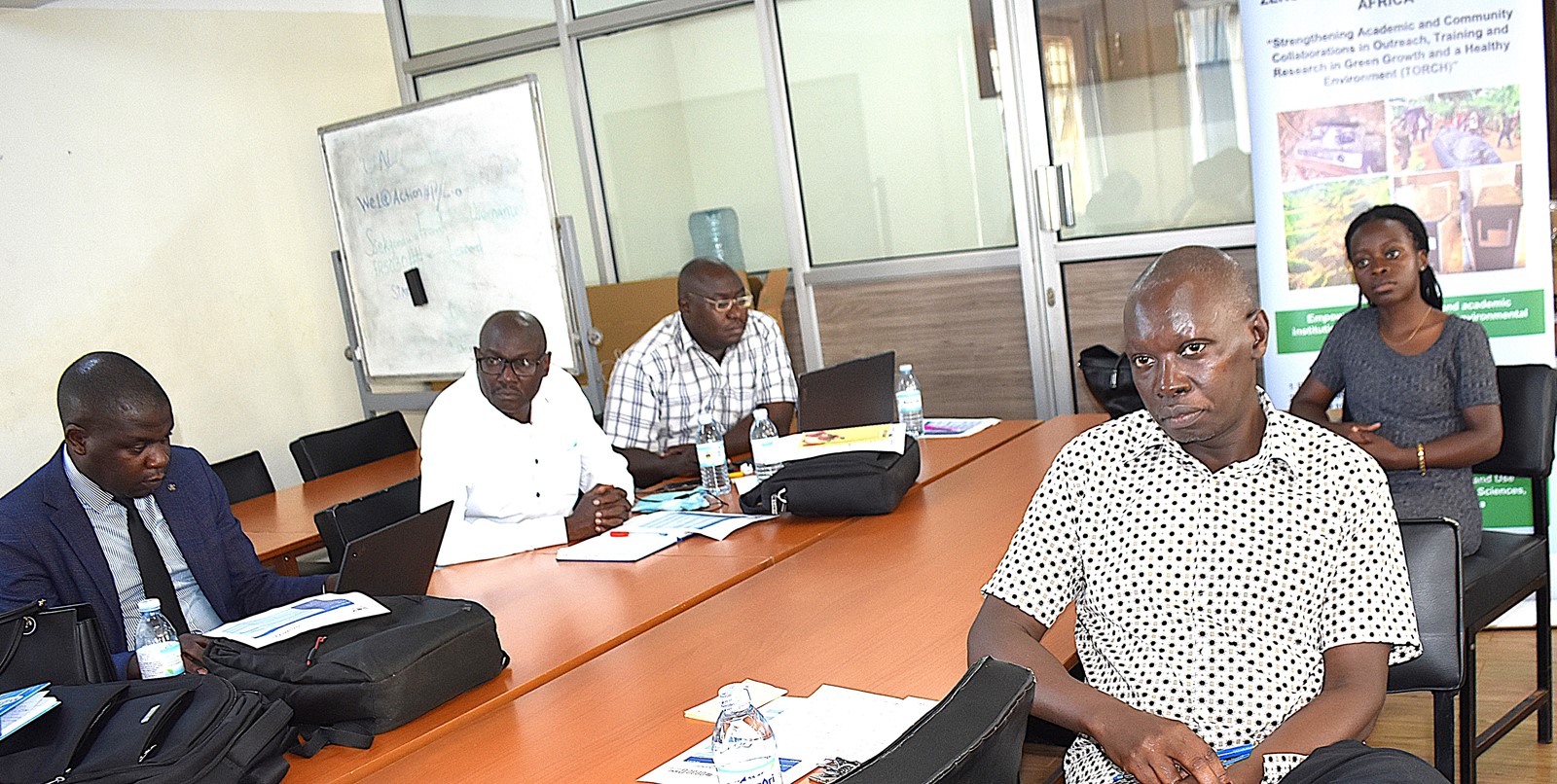
Officially launched by the Principal of CAES, represented by Dr. Paul Mukwaya, Head of the Department of Geography, Geo-Informatics and Climatic Sciences at Makerere University, TORCH builds upon existing East African government policies. The project will implement the innovative concept of living labs, where universities, communities, and stakeholders co-design, co-create, and co-produce affordable, reliable green technologies tailored to local needs.
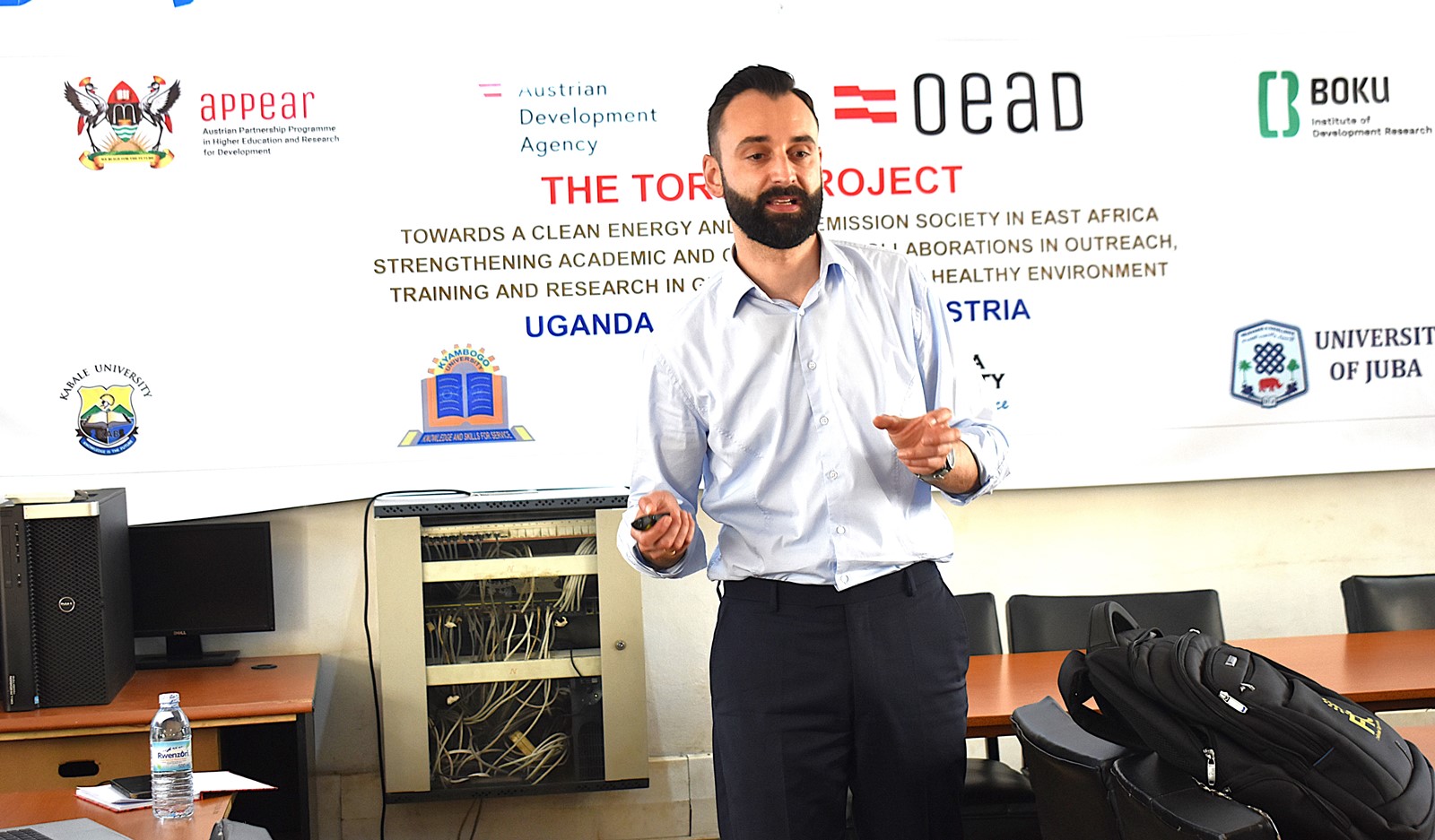
Key Objectives and Activities
TORCH aims to:
- Enhance teaching on green growth by integrating principles into selected academic curricula.
- Establish three living laboratories in Central, South Western, and Eastern Uganda to boost co-creation on energy efficiency and low-carbon emissions.
- Increase human capacity through short courses, field research, and training.
- Empower women in science and technology.
- Promote novel green technologies and support policy transformation.
- Strengthen partnerships among universities in East Africa.
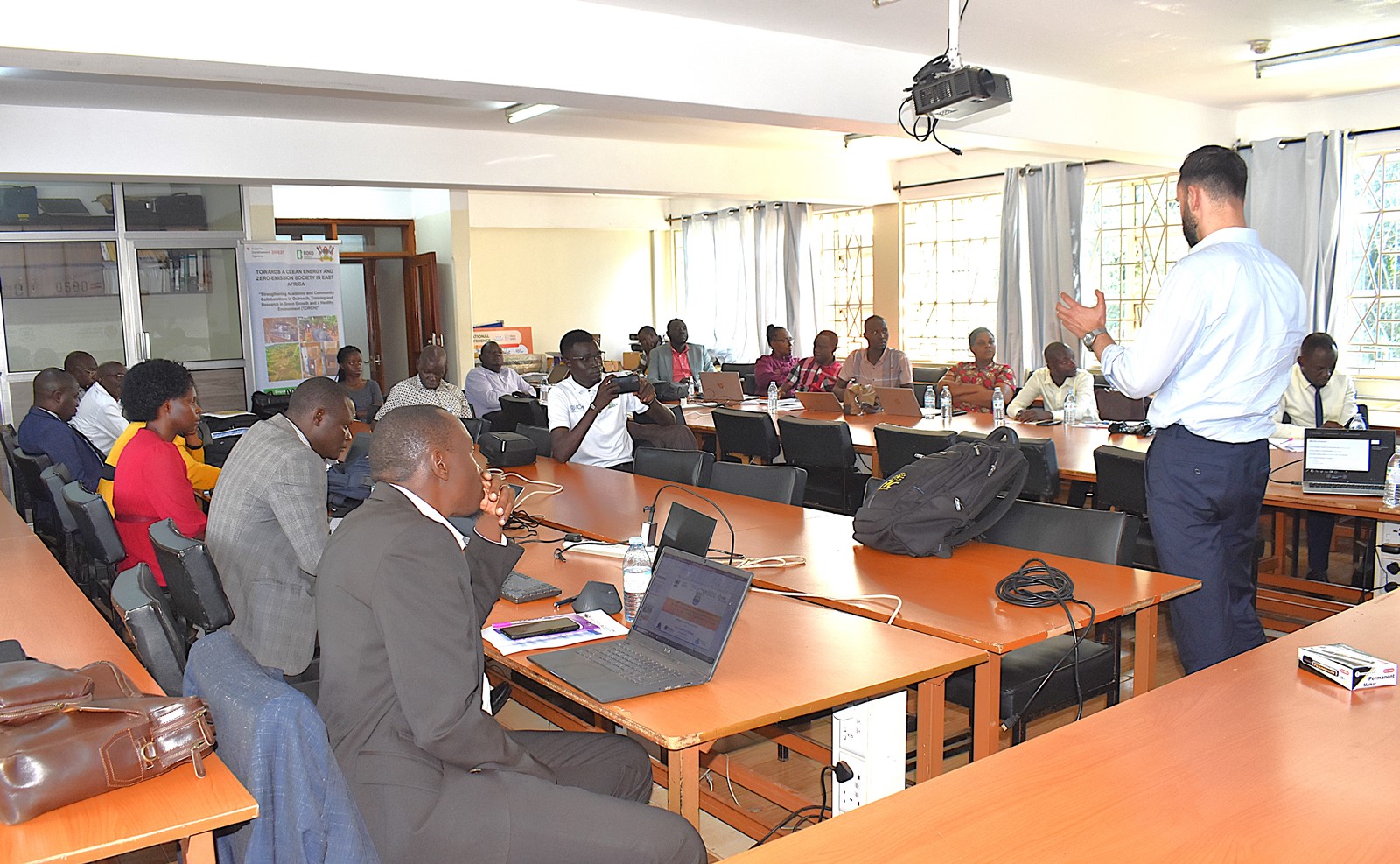
These activities directly contribute to achieving several Sustainable Development Goals (SDGs), including SDGs 4 (Quality Education), 5 (Gender Equality), 6 (Clean Water and Sanitation), 7 (Affordable and Clean Energy), 12 (Responsible Consumption and Production), and 13 (Climate Action), while also reducing health risks and conserving the environment.
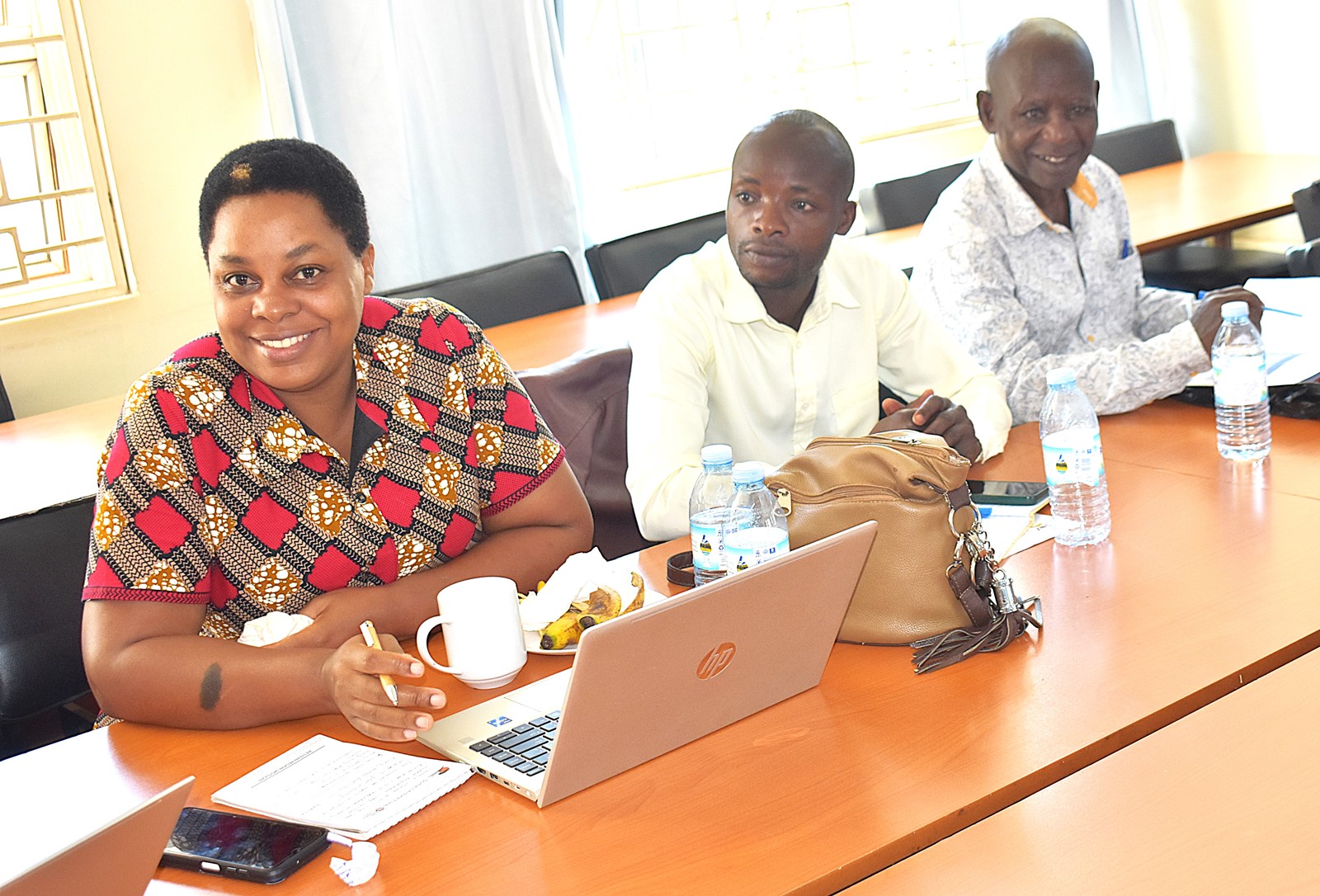
Leadership and Partner Institutions
The overall project coordinator is Dr. Patrick Musinguzi, Lecturer in the Department of Soil Science and Land Use Management at Makerere University. TORCH involves several partner institutions, including: Makerere University (Uganda), University of Natural Resources and Life Sciences, Vienna (Austria), Kabale University (Uganda), Busitema University (Uganda), Kyambogo University (Uganda), and the University of Juba (South Sudan).

Highlights of the Launch Ceremony
During the launch ceremony held in the GIS Lab at Makerere University, and attended by representatives from the partner institutions, Dr. Musinguzi presented an overview of TORCH, outlining key strategies for implementation and expected outcomes. Central to the project’s strategy is the integration of green growth principles into Makerere University’s academic curriculum. This will be formally proposed to the University Management for adoption. Additionally, the project aims to strengthen the university’s research agenda in this critical area. This will involve supporting faculty and student-led research projects and generation of evidence-based insights on green growth to influence policy at both local and national levels. There are also plans to establish three living labs in Central, South Western, and Eastern Uganda to serve as practical hubs for advancing green growth.
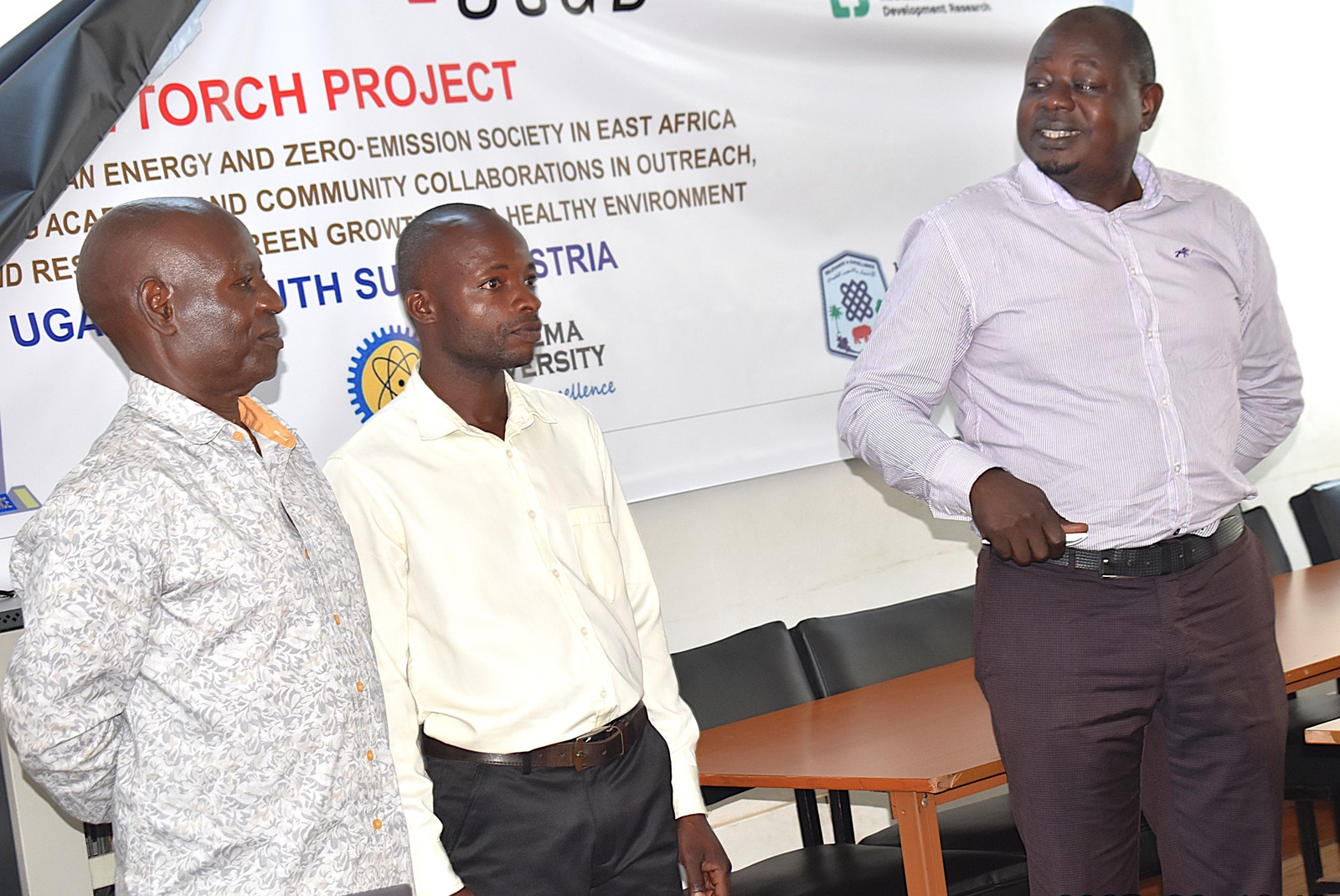
Expert Insights on Community Engagement
In his presentation, Mr. Andreas Bauer from the University of Natural Resources and Life Sciences, Vienna provided valuable insights into the critical role that living labs play in promoting sustainable, green growth. Highlighting practical examples and innovative approaches, Mr. Andreas Bauer emphasized how living labs serve as dynamic platforms for collaboration between researchers, industry stakeholders, and local communities, enabling real-world experimentation and the development of eco-friendly solutions that drive environmental and economic progress.
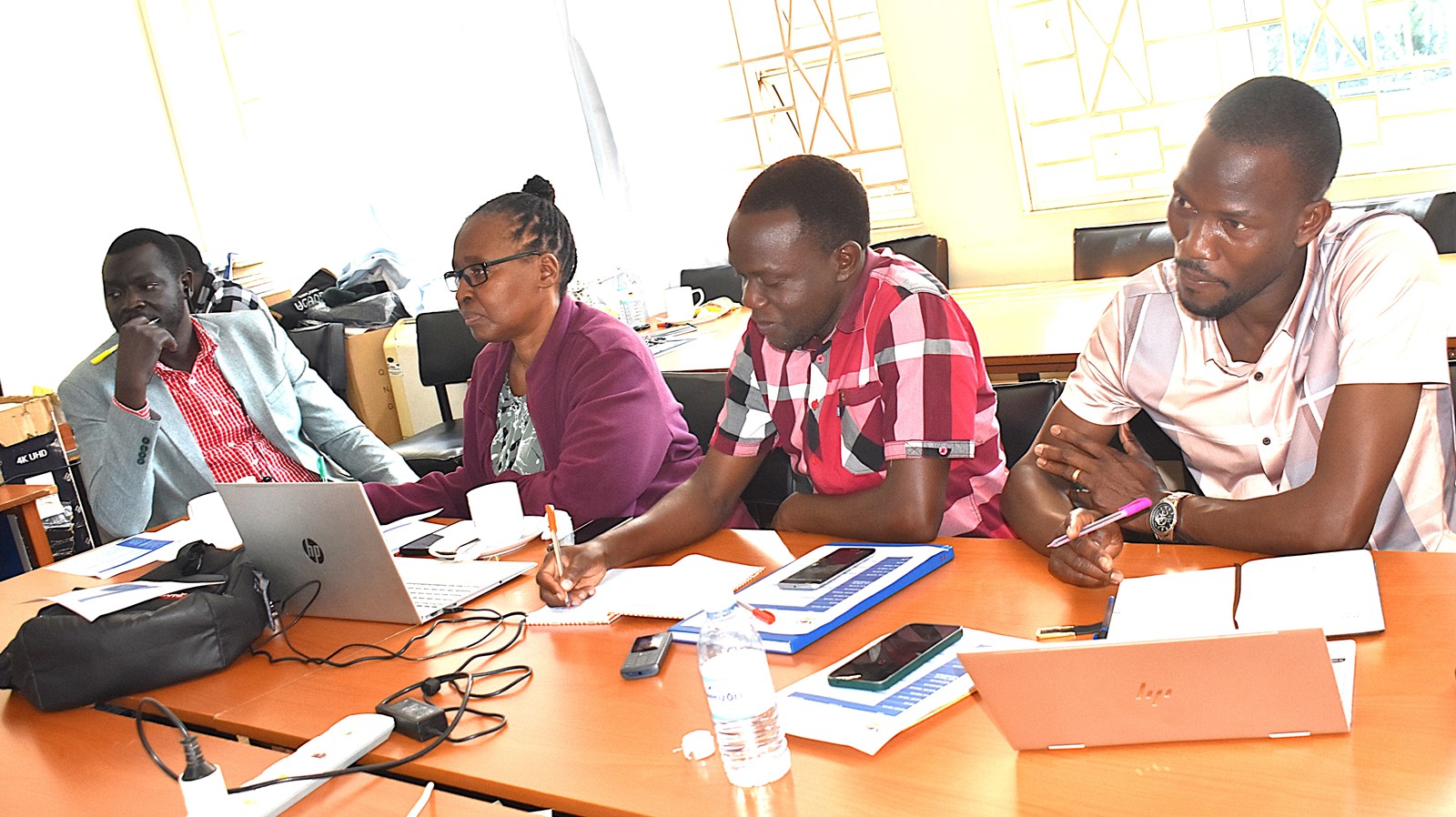
To emphasize the importance of collaboration between local communities and the academia, Mr. Kayanja Susane, a farmer from Kawumu Village in Luweero District, explained that, with guidance and support from the project team, he learned to produce biogas from animal waste -a reliable source of energy that reduces dependence on traditional fuels, subsequently minimizing environmental degradation.
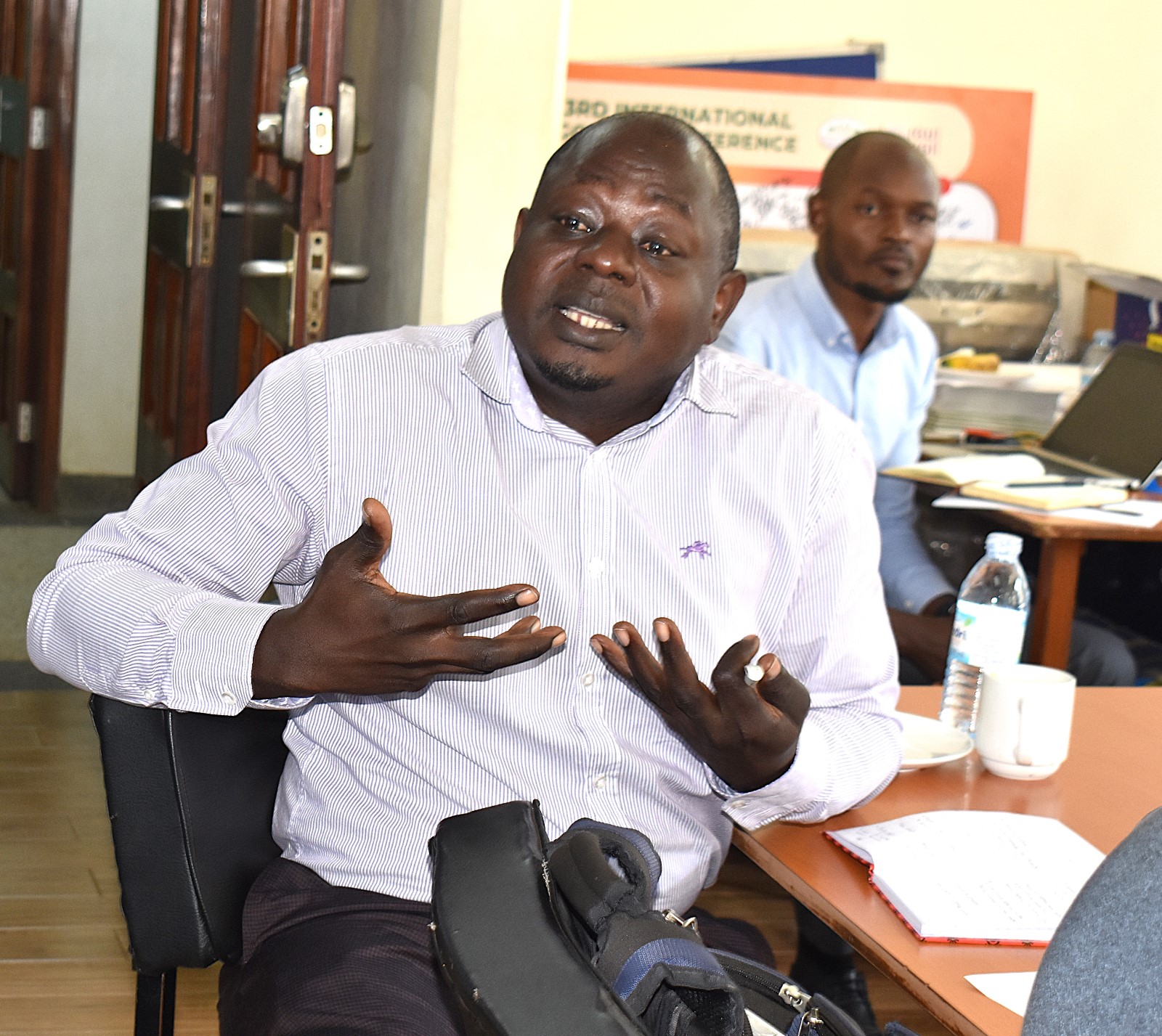
Research Focus
As part of the strategy to guide implementation, the project team brainstormed potential ecological and social indicators of low emissions in homesteads, and proposed several research areas to support green growth. Proposed research areas include:
- Life cycle analysis
- Circular economy practices within homesteads
- Gender integration and the intersection of gender with green growth
- The role of livestock in promoting green growth
- Evaluating the impact of interventions on total emissions
- Barriers to adopting green innovations
- The use of indigenous knowledge in promoting green growth
Addressing the participants, the Principal of the College of Agricultural and Environmental Sciences (CAES), represented by Dr. Paul Mukwaya, Head of the Department of Geography, Geo-Informatics, and Climatic Sciences at Makerere University, commended the project as a timely initiative aligned with the University’s research agenda. He underscored the importance of collaborating with other stakeholders, noting that similar projects have been conducted within and outside Makerere. Dr. Mukwaya called for the adoption of the theory of change framework to ensure the project delivers measurable, sustainable impacts that extend beyond policy briefs and gender mainstreaming, ultimately contributing to lasting green transformation in the region. He expressed appreciation to the project funders for their unwavering support to Makerere University.
Trending
-

 Education1 day ago
Education1 day agoAdmission List to Bachelor of Education External (BED) 2025/26 -Private Sponsorship
-

 General1 week ago
General1 week agoMature Age Scheme Exam Results for 2025/2026
-

 General2 weeks ago
General2 weeks agoFreshers’ Joining Instructions 2025/2026
-

 General4 days ago
General4 days agoUndergraduate Admission List Self Sponsorship Scheme 2025/2026
-

 General2 weeks ago
General2 weeks agoMastercard Foundation Board pays its inaugural visit to Makerere University
